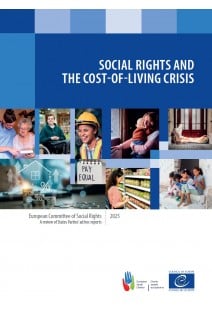The review provides a general overview of the social rights impacts of the cost-of-living crisis within the Council of Europe member states; as well as the measures taken by states in response to the crisis.
In it, the ECSR sets out what the Charter requires in situations where the cost of essentials rises much faster than average household incomes and provides guidance and recommendations to be used as a framework by States Parties.
The European Social Charter, adopted in 1961 and revised in 1996, is the counterpart of the European Convention on Human Rights in the field of economic and social rights. It guarantees a broad range of human rights related to employment, housing, health, education, social protection and welfare.
The Charter is therefore seen as the Social Constitution of Europe and represents an essential component of the continent’s human rights architecture.
The European Committee of Social Rights is the monitoring body of the Charter. It rules on the conformity of the situation in States with the Charter under two complementary mechanisms: through collective complaints lodged by the social partners and non-governmental organisations (collective complaints procedure), and through national reports drawn up by the States Parties (reporting procedure).
EXECUTIVE SUMMARY INTRODUCTION SOCIAL PROTECTION
Introduction
Questions and States Parties responses
Strengths and weaknesses of the measures adopted
Conclusions and recommendations
EMPLOYMENT AND WAGES
Introduction
Questions and States Parties responses
Strengths and weaknesses of the measures adopted
Conclusions and recommendations
HOUSING
Introduction
Information submitted by States Parties
Strengths and weaknesses of the measures adopted
Conclusions and recommendations
ENERGY AND FOOD
Introduction
Questions and States Parties responses
Strengths and weaknesses of the measures adopted
Conclusions and recommendations
GROUPS PARTICULARLY AFFECTED BY THE COST-OF-LIVING CRISIS
Introduction
Questions and States Parties responses
Low-income households
Children
Persons with disabilities
Older persons
Conclusions and recommendations
STATEMENT OF INTERPRETATION ON SOCIAL RIGHTS AND COST-OF-LIVING CRISES
Social protection
Employment and wages
Housing
Energy and food
Groups particularly negatively affected by cost-of-living crises
Conclusion
CONCLUSION APPENDIX I - SUMMARIES OF STATES PARTIES AD HOC REPORTS ON THE COST-OF-LIVING CRISIS APPENDIX II - COMMENTS FROM THIRD PARTIES




